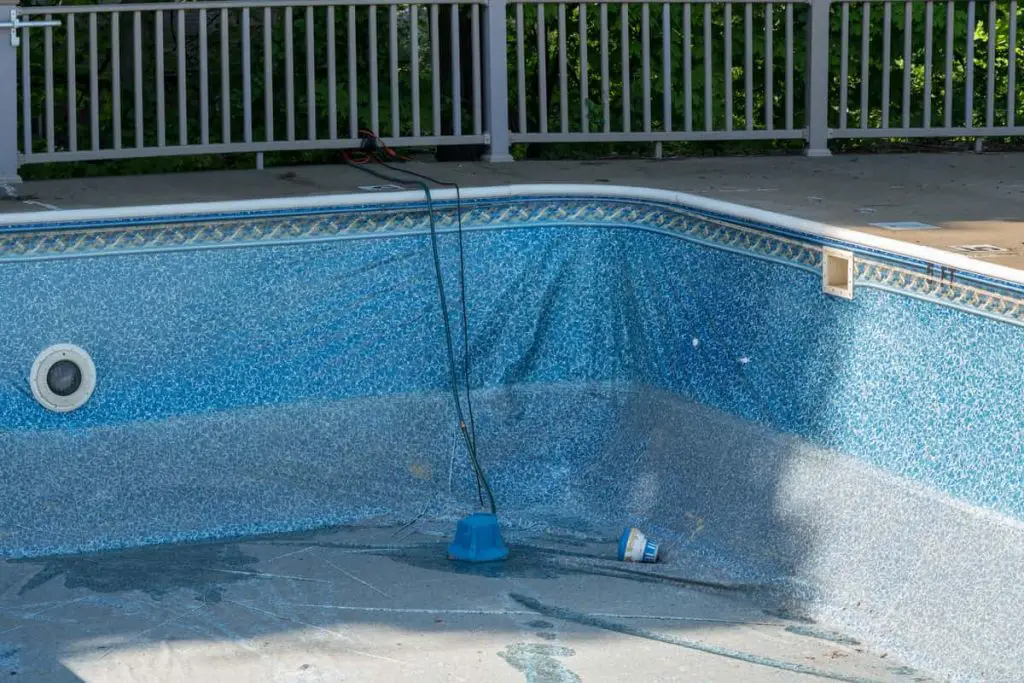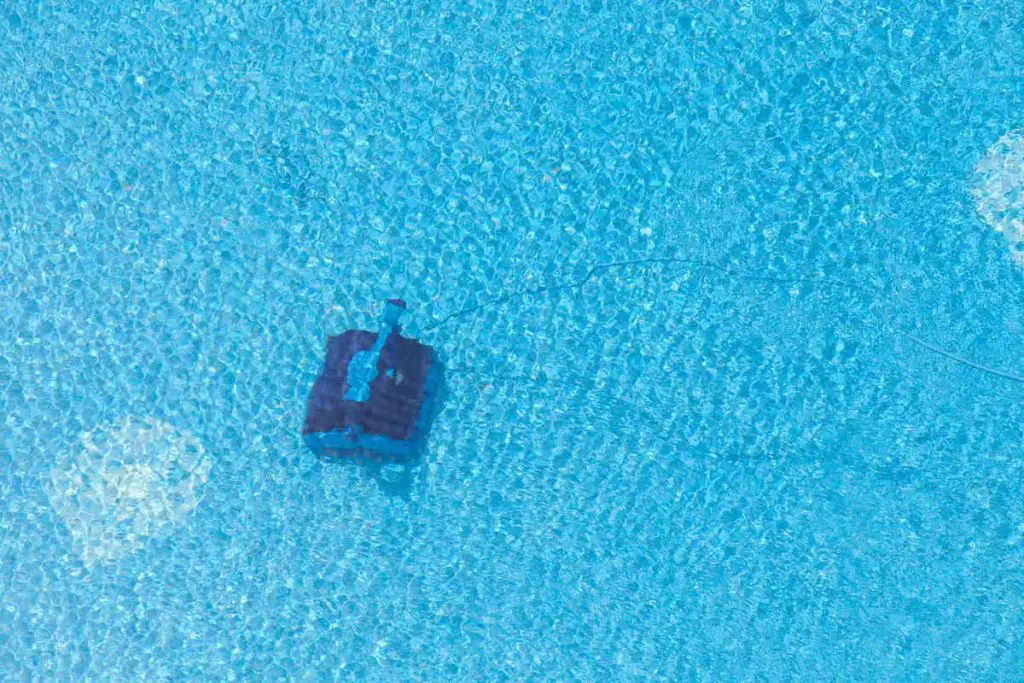Robotic pool cleaners are the easiest and most effective way to attain and sustain spotless floors, coves, steps, and walls. However, robotic pool cleaners do not have identical specs, and there are various pool surface types. So, do robotic pool cleaners damage vinyl liners?
Most robotic pool cleaners do not damage vinyl liners as their components are made of smooth plastic, rubber scrub brushes, and rubber wheels. Only in a situation where a cleaner’s components have been compromised is damage a valid concern.
While most cleaners themselves may not cause damage to your vinyl liner, this isn’t to say that a liner may not be at risk when using a pool cleaner – robotic or not. It’s critical to understand what may cause a liner to be susceptible to damage during cleaning.

Why Robotic Pool Cleaners Do Not Damage Vinyl Liners
A majority of robotic pool cleaners available today are suitable for vinyl liners. If you are familiar with the popular brands, like Dolphin, Zodiac, Hayward, Pentair, or Autobot, most of them have several robotic pool cleaners that are fit to use with vinyl liners.
For example, the Dolphin Nautilus CC Plus from Maytronics is the robotic cleaner that both my brother-in-law and I currently use. He uses his on his vinyl liner pool and I use it on my concrete pool. The build quality of this machine is thoughtful, and in examining it there is no reason I would be concerned with using it on a liner.
You can check out the details of it on Amazon here
Although these manufacturers’ models have distinct specifications, their robotic pool cleaners for vinyl liners have similar features that make them effective and safe to use with vinyl. Let me highlight a few of these features.
Vinyl Liner Robotic Pool Cleaners Use Rubber Brushes
Robotic pool cleaners made for vinyl liners use a soft material, like rubber, for the brushes and scrubbers. The scrubbing action of this material is effective, but its softness and flexibility prevent scratches, dents, peeling, chipping, or cracking.
Thus, the brushes or scrubbers are unlikely to damage your pool’s vinyl unless the liner is in dire condition.
Vinyl Liner Robotic Pool Cleaners Aren’t Sharp
Robotic pool cleaners usually have tracks and wheels made of plastic, rubber, or composite material, depending on the manufacturer and model. However, these cleaners don’t use wheels or tracks with sharp threads.
You don’t have to worry about any scratching, slicing, or piercing action on the vinyl liner! The brushes and scrubbers will have some abrasive effect, but it is not sharp and certainly won’t pierce the vinyl.
Robotic Pool Cleaners Are Lightweight
Robotic pool cleaners can be as light as 11 lbs. (5 kg) or heavier than 20 lbs. (9 kg). The tool’s weight obviously increases if you add the debris and transiting water during cleaning. However, like all objects, robotic pool cleaners are reasonably weightless due to the buoyancy effect while in the water.
Some robotic pool cleaners may float on the pool if there is trapped air inside. An automatic pool cleaner sinks as it gets filled with water and the diaphragm inside stabilizes it when submerged. So, you need not worry about a robotic pool cleaner’s weight on vinyl liners.
When Robotic Pool Cleaners Can Damage Vinyl Liners
Vinyl liners are not invincible. Standard vinyl liners last for about 5 to 10 years. The best vinyl liners available may last about 20 years. Also, the water parameters or poor chemistry can adversely affect the vinyl. This is why testing your pool water frequently to make sure it is balanced is so important!
For quick and easy water testing, I personally use this kit from Amazon.
On the other hand, robotic pool cleaners don’t function as intended or expected all the time. A pool’s layout, vinyl liner’s condition, and variable factors in a given setting can cause problems. There are scenarios when robotic pool cleaners can damage vinyl liners.
Vinyl Liners Are Already Damaged or Degraded
A robotic pool cleaner may damage vinyl liners in the following circumstances:
- The vinyl liners in residential pools can be 20 to 30 mil thick (0.02 to 0.03 inches). Thin vinyl liners are vulnerable to damage, especially if a robotic pool cleaner is too powerful.
- Damaged or degraded vinyl liner can deform easier. You may have creases on the vinyl. A few parts may be uneven or chipped. Also, cracks and peels make vinyl liners more fragile.
- Vinyl liners degrade in unsuitable water conditions. These include water with a pH of less than 7.0 or more than 7.8 or total alkalinity of less than 80 ppm and more than 125 ppm.
- Faded, worn out, and extensively deteriorated vinyl liners are susceptible to damage.
If your vinyl liner already has tiny holes, leaks, or damaged patches, a robotic pool cleaner will aggravate the problem. However, you cannot blame the robot. You must consider repairing or replacing the vinyl liner before using the cleaner.
Where Vinyl Liners Are Most Vulnerable
A pool’s vinyl liner at or around the waterline is usually the most vulnerable because the portion remains exposed. A typical vinyl liner can be dry, scaled, and susceptible to peeling or chipping at or near the waterline and coping. Thus, you must pay extra heed to this entire waterline part.
Modern robotic pool cleaners with wall climbing features can clean the entirety of your vinyl liner. While the wheels or tracks movement, vacuum action, brushing, or scrubbing may not damage the floor or walls, the same abrasion may be too much around the waterline.

Robotic Pool Cleaner Gets Stuck
Robotic pool cleaners can go about their task without any supervision or manual intervention. The smart tools available nowadays can even map the shortest route and deal with a few obstacles. Still, a robotic pool cleaner can get stuck at one place inside your pool.
The most common hindrances are the steps and unusual contours of the pool’s layout. Also, a fixed installation inside the pool may block the robot’s movement.
In such cases, robotic pool cleaners may continue to brush, scrub, and move their wheels or trucks in one place. Continuous abrasion at one place creates friction, and that can damage vinyl liners.
In some instances, a robotic pool cleaner may get stuck without any obstruction due to some mechanical or electrical failures.
The tool won’t damage vinyl liners if all its functions stop. However, if the wheels or tracks continue to run in the same spot, the liner surface may suffer some or significant wear and tear.
Broken Parts on Robotic Pool Cleaner
Last but not least, protruding or loose broken parts of robotic pool cleaners can cause excess abrasion. Sharp parts can cause punctures, too.
A robotic pool cleaner getting tangled with toys or solid objects with sharp edges that it can drag along may cause tears, leaks, or other damage to vinyl liners. Worn out parts from leaving the cleaner in the pool at all times can lead to breakdowns as well.
Furthermore, accidentally stepping on robotic pool cleaners and increasing the pressure on the vinyl liner when it is working may cause some damage. This kind of damage may be cosmetic or structural.
Conclusion
Generally, suitable robotic pool cleaners won’t damage new or reasonably maintained vinyl liners. However, any anomaly can change this, whether it’s the condition of your vinyl liner or the functions of the robotic pool cleaner. You want to be proactive to mitigate the risk factors.
Sources
- Latham Pool Products: Fiberglass vs. Concrete vs. Vinyl Liner Pools: Which Is Right For Me?
- Orenda Technologies: Understanding Vinyl Liner Pools
- River Pools: Vinyl Liner Pool Basics: Pros, Cons, and How They’re Made
- Loop-Loc: Vinyl Swimming Pool Liner Maintenance and Care
- Latham Pool Products: The Typical Life Cycle of the Vinyl Liner in Your Swimming Pool
- Loop-Loc: Myths and Facts about Vinyl Liners
- SwimmingPool.com: Avoid These Vinyl Liner Mistakes: 6 Causes of Pool Liner Damage
- Trouble Free Pool: Pool Robots Causing Damage To Vinyl Liners? Is This True?
- Robot Shop: Will a Robot Pool Cleaner Damage My Vinyl Lining
